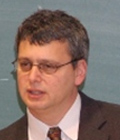Speakers and conference papers

Introduction
Liz Alden Wily was born in New Zealand, is a British citizen, lives in Kenya, and works in Africa and Asia, and at global levels on issues of majority land rights. She is both an independent scholar and practitioner. Although she works a great deal with agrarian law reform, Liz is a political economist by training (PhD, University of East Anglia, UK). Since 1992 she has worked as an independent consultant on land tenure and administration reforms, with national governments, international agencies, non-government organisations, and research groups. Her principal foci are (i) the national law status of untitled community rights to upwards of six billion hectares of rangelands, forests and marshlands in agrarian continents; (ii) the establishment of modern community based tenure and governance regimes, and within which locally-driven conservation imperatives are integrated; and (iii) the achievement of ‘people’s law’ in the sense of arriving at land and resource legislation through locally developed and tested procedures. Towards this Liz frequently designs and facilitates piloting of new tenure paradigms (e.g. as in Afghanistan, Sudan, Tanzania, Liberia and Nepal). Liz is also known for establishing the first indigenous peoples land rights programme in Africa (Botswana) and for initiating the successful mass forest conservation approach through establishment of community owned reserves. She has published extensively on tenure and related governance issues, focusing recently upon the effects of the global land rush. Her most recent publication examines the handling of land relations in conflict-prone Afghanistan since the signing of the Bonn Peace Agreement in 2001. Liz is a member of the International Association of the Commons, informally advises six NGOs and international associations, is a fellow of the global Rights and Resources Initiative, and an affiliated fellow of the Van Vollenhoven Institute of the Leiden University School of Law.
Speech Title: The Law and Land Grabbing: Enabler or Victim
This keynote reflects upon the role of law in the contemporary surge in global large-scale land acquisition. Its point of reference is the land security of nearly two billion rural poor who depend not only upon the farm but also upon off-farm resources they share in common, but which tend to be the legal property of the state. A premise of this paper is that off-farm lands or commons are inevitably the major target of large-scale acquisitions and brings the contradictions of customary and statutory land law most clearly to the fore. First, to locate the current land rush correctly and to better appreciate its force, this paper shows how this is only the most recent of many surges characterising ever-globalizing capitalist expansion through land takings at scale, consistently targeting the most poor. The role of state law in opening paths and legitimising losses at scale is specifically examined. Findings suggest that the law is as much a victim of flawed state-making processes and classical transformation approaches, as purposive enabler in the demise of majority land interests. This duality continues in examination of current transitions in agrarian land law in critique of the directions in which they selected new laws reconstruct paradigms of possession in pre-state and current customary law. This links to exploration of the central legal paradigm affected in land rushes, if and how rural populations may secure lands communally and with comparable levels of protection due statutory private property. Shortfalls mirror unresolved contradictions in modes of social transformation and growth. Using cases from several regions, positive shifts in the legal handling of collective rights are shown to provide a significant bulwark against involuntary mass dispossession. In the process, this can also help reshape the path which large-scale land commercialization takes towards more inclusive models. However, for this to be effective and lasting, governments and communities need to look afresh at the structure of community-based law and at the altering formation of agrarian community itself. Without more pragmatic tenure constructs which embrace changing formations and interests, community-derived property rights may indeed be large-scale casualties.

Introduction
Professor Lee is a scholar and lawyer in international economic law and law and development. He is currently Professor and Chair of International Economic Law at the University of Manchester and Director of the Law and Development Institute. He has also taught and conducted academic research at leading universities throughout the United States, Asia, and Australia. He graduated in economics with academic distinction from the University of California at Berkeley and received law degrees from the University of Cambridge (B.A., M.A., Ph.D). Author of Reclaiming Development in the World Trading System (Cambridge University Press, 2006, reprint 2009), Safeguard Measures in World Trade: The Legal Analysis (Kluwer Law International, 2nd ed. 2005, reprint 2007), and Law and Development Perspective on International Trade Law (co-authored, Cambridge University Press, 2011), Professor Lee has published over sixty scholarly articles, book volumes, chapters and shorter notes with leading publishers in North America, Europe, and Asia, in the areas of international economic law, law and development, comparative law, and international commercial arbitration. He has pioneered academic research on safeguard measures (emergency import restraint measures) under the World Trade Organization (WTO) system and developed the concept of “microtrade”, a new system of international trade designed to alleviate populations of the least-developed countries of extreme poverty. His work has focused on the impacts that domestic and international legal systems, particularly the legal framework for international trade, have on economic development. He is currently an associate editor of the Journal of World Trade and the founding editor-in-chief of the Law and Development Review. Professor Lee has participated in a number of bilateral and multilateral negotiations on international trade and investment at international forums such as the United Nations Commission on International Trade Law. He has appeared before WTO dispute settlement panels and the WTO Appellate Body as a government counsel, and advised national governments, international law firms, and consulting companies on international trade and development projects and major international commercial arbitration cases. He has frequently spoken on issues of international economic law, law and development, and the WTO at prominent forums including Harvard University Kennedy School of Government and the Johns Hopkins University School of Advanced International Studies.

Introduction
Dr. Andreas Neef is Professor of Resource Governance and Participatory Development at the Graduate School for Global Environmental Studies, Kyoto University. He holds a PhD degree in “Agricultural Sciences (Agricultural Economics and Rural Sociology)” and a post-doctorate degree in “Social Sciences in Agriculture”, both from the University of Hohenheim, Stuttgart, Germany. He has extensive research experience in Southeast Asia, West Africa, the South Pacific and the Middle East and has served two times as scientific consultant for the German Parliament. His research focuses on natural resource governance, land grabbing, participatory approaches to agricultural and environmental research, rural innovation processes, supply-chain and network analysis, post-disaster response and recovery, and local adaptation to climate change.

Perry Bechky is a Visiting Scholar at the Seattle University School of Law and a Senior Attorney at Dorsey & Whitney LLP. He has nearly twenty years of experience as an international lawyer. He has practiced, written, and taught in the fields of international arbitration and litigation, international investment, international trade, public international law, and regulation of international business. He has visited on the law school faculties at the University of Connecticut and Seattle University, and also taught as an adjunct professor at the law schools at George Mason University, Howard University, and the University of Virginia, as well as at the Stanford-in-Washington program for undergraduates. He graduated from Stanford University and Columbia Law School.
Presentation Title: A Primer on International Investment Law
This presentation offers a primer about international investment law for scholars attending the 2013 Law and Development Conference, as this is a critical field of international law affecting the relationships between land owners and governments. More specifically, this presentation will address the following aspects of international investment law: the purposes of international investment law, with special reference to the relationship between development-promotion and international investment law; the origins, rise, and significance of the modern network of bilateral investment treaties; current developments and trends in international investment law, including the China-Japan-Korea treaty and the Trans-Pacific Partnership negotiations; the definition of “investment” and its application to land ownership; the key rights typically granted to investors, including the “pre-entry” rights of those intending to invest; the arbitration regime for the enforcement of investors’ treaty rights, with special reference to cases concerning the rights of land owners; the relationship between international investment law and other important concerns, including human rights and environmental protection, as illustrated by the defenses available to states in investment treaty arbitrations and the ability of civil society groups to participate meaningfully in such arbitrations; and contemporary efforts to add investor responsibilities into international investment law.

Introduction
Uché Ewelukwa Ofodile is a professor of law at the University of Arkansas School of Law in Fayetteville, Arkansas, where she teaches foreign investment law and investment disputes, international business transactions, international trade law, international intellectual property law and international human rights law. Professor Ofodile is an active member of the American Bar Association Section of International Law and currently serves as the Vice-Chair of the International Intellectual Property Committee and the Vice-Chair of the Corporate Social Responsibility Committee of the Section. She is also a member of the steering group of the Section’s International Investment and Development Committee and a member of the American Society of International Law. Professor Ofodile has been a visiting professor at several universities around the world including universities in Eastern Europe (e.g. American University of Armenia) and Africa (for example, the Trade Policy Training Center in Africa based in Tanzania). She has also taught at the University of Puerto Rico School of Law and was the Crowe and Dunlevy International Visiting Professor of Law at the Oklahoma Law Center. Professor Ofodile graduated with a Bachelor of Laws degree (LL.B.) from the University of Nigeria with the highest honors. She has a Diploma in International and Comparative Human Rights Law from the International Institute for Human Rights in Strasbourg, France. Professor Ofodile also holds a Master of Laws degree (LL.M.) in international business law from the University College London, another LL.M. degree in international law from Harvard Law School, and a doctorate degree (S.J.D. degree) from Harvard Law School. She has published widely in reputable international journals.
Presentation Title: Interaction between Foreign Investment in Land and International Investment Law Regime: History, Trends, Pitfalls and Options
The paper will look at the role of international investment law regime in foreign land deals in developing countries. Specifically, the paper will examine how bilateral investment treaties (BITs) and the system of investor-State dispute settlement enable the process of large-scale land acquisition in Africa and Asia. The paper will also examine ways that a new generation of BITs can constrain such processes. BITs and other international investment agreements (IIAs), if carefully drafted, can play a significant role in maximizing opportunities and mitigating risks associated with foreign investment in land. Unfortunately, many countries are not presently utilizing the available options. However, there is evidence that this situation is about to change. For most countries in Africa, the question is not simply whether to reject or embrace foreign acquisition of arable land. The more critical and more complex question is how to seize the opportunities that foreign direct investment (FDI) in land presents while at the same time taking measures to mitigate associated risks. In this regard, laws, policies, and institutions arguably play very important roles. The paper will highlight the growing complexity in the rules governing foreign investment in agricultural land and will underscore the need for countries to understand how the different rules interact with one another and with underlying investment contracts. Drawing from the experience of several countries with investment arbitration, the paper will also highlight the dangers that flow from BITs that are not carefully drafted. As the paper will show, sometimes a provision in an investment contract is circumscribed by a contrary provision in a BIT or other IIAs. Other times, a provision in one BIT is overtaken by a provision in another BIT or a free trade agreement (FTA). As developing countries become increasingly bound by more and more investment agreements and investment-related agreements, it is important to fully analyze and appreciate how the different treaties interact with one another, with domestic law and with land investment agreements. Countries must develop the capacity to understand growing interface between different international investment agreements. Ethiopia, for example, has signed about 30 bilateral investment treaties, is a member of the Common Market for Eastern and Southern Africa (COMESA), is a party to the World Bank’s Convention on the Settlement of Investment Disputes between States and Nationals of Other States (ICSID) and the World Bank’s Multilateral Investment Guarantee Agency (MIGA), has double taxation treaties with about 12 countries, and has ratified both the International Covenant on Civil and Political Rights (11 June 1993) and the International Covenant on Economic, Social and Cultural Rights (11 June 1993) and also the African Charter on Human and People’s Rights (15 June 1998). How these treaties impact and shape underlying land agreements that Ethiopia has entered and is entering into is a question deserving immediate and urgent attention.

Introduction
Elisabeth Bürgi Bonanomi, attorney at law, expert in international public law is affiliated to both the Center for Development and Environment CDE and the World Trade Institute WTI of the University of Bern, Switzerland. Besides of having practiced in domestic and international agricultural, economic, financial and human rights law, she has – for instance – been in charge of a research project on trade and human rights, of a book project on the concept of sustainable development in international law, and of a research project on sustainable trade in agriculture. As a Senior researcher, she is currently lecturing in International Sustainable Development Law and Legal Coherence Theory, is significantly involved in an interdisciplinary research project on the effects of large scale investments in agriculture on the various dimensions on sustainable development, and is counseling development agencies both on human rights-sensitive sustainability impact assessments of trade and investment agreements and on sustainability impacts of international tax agreements.
Presentation Title: Responsible Investments in Land presume a Responsible Trade Regime
Whether investments in agricultural land in the Global South are sustainable or not, not least depends on the legal framework within which these investments take place. This is true for the domestic legal framework of both the country from which investments originate, and of the host country. But also the international legal framework in which home and host states are embedded contributes both positively and negatively. On the one hand, a range of human rights and environmental treaties assists in ensuring a careful treatment of land and land rights. On the other hand, particularly trade and investment treaties tend to unilaterally protect investors’ rights, while investors’ duties tend to be attached less importance. Hence, this paper will first introduce the most important legal entry points in the field in order to inform non-legal scientists and to make them familiar with the ongoing debate which is based on coherence theory. In doing so, it will primarily focus on the agricultural trade regime and point at related incoherencies. This assists in indicating on which trade related questions future inter-disciplinary case studies should focus. In this context, the paper will also present the outline of a present study, conducted both by the CDE and the WTI and supported by the Swiss National Fund, which seeks to capture the sustainability record of large scale land investments which originate in Switzerland, and to define most optimal policy responses on the different levels of governance, including the trade regime.

Introduction
Dr. Lorena Ossio Bustillos is a Senior Researcher at Max-Planck-Institute for Social Law and Social Policy, Department of International and Foreign Social Law in Munich; since September 2008 her field of responsibility has been Social Protection in Latin America. Professor for Legistics, Indigenous Law, Human Rights and Public Law at the Universities of Nuestra Señora de La Paz, Catholic University und Andina Simón Bolivar and academic coordinator of the program for Doctor Degree Studies at the University Mayor de San Andrés in La Paz and Lecturer at the German University of Administrative Sciences, Speyer. She has 3 books on indigenous law in Latin America, 1 in Legistics and several academic articles/chapters in books on constitutional law and social rights, administrative law and social protection systems in Latin America, published in German, English, Spanish, Portuguese and Italian. She is scientific member of the Project Administrative Law in South America at the Fluminense Federal University, Rio de Janeiro.
Presentation Title: Indigenous People in Latin America and the Right to Non-renewable Natural Resources: The Bolivian Case
The second Article of the new Bolivian Constitution from 2009 refers to the exercise of free determination of the native indigenous peasant nations and peoples. Using this article as a basis we understand free determination as their right to autonomy, self-government, to their culture, to the recognition of their institutions and consolidation of their territories, according to this Constitution and the law. In the specific case of the right to non-renewable natural resources consultation is required; for all the other cases they enjoy the right to be consulted by means of appropriate procedures, particularly through their institutions, each time legislative or administrative measures which can affect them are envisaged. They have the right to partake of the benefits of exploiting natural resources in their territory. They have the right to an autonomous indigenous territorial administration, and the exclusive use and exploitation of renewable natural resources in their territory without prejudice to the lawfully acquired rights of third parties. On the other hand, Article 346 of the Bolivian Constitution considers the natural heritage is of public interest and of strategic importance for the country’s sustainable development. Conservation and use for the benefit of the people shall be the responsibility and exclusive authority of the State, and not compromise the sovereignty over natural resources. The law establishes the principles and arrangements for its management. Our research questions are: What is the relationship between customary rights over natural resources and national tenure legislation over natural resources? What should be the contents of this Law that should establish the principles and arrangements for the management over natural resources? What is the relationship between social function and collective property? If we take into account the majority of Latin American countries, we can see that in regard to the issue of water resources their respective national legislation, public administration and policies tend to deny or ignore the existence or importance of customary normative frameworks regarding indigenous community rights and practices, and water management. Even in those cases in which the regulations of local indigenous-peasant communities are taken into account.
Introduction
Sayaka FUNADA CLASSEN (Dr.) was born in Kyoto, Japan. She received a Master’s degree in International Relations from Kobe City University of Foreign Studies in 1995, and a Ph.D. degree in International Relations from Tsuda College in 2006. She received an award from the Japan Association for African Studies in 2008 for her book “History of Armed Liberation Struggle in Mozambique”, published based on her Ph.D. dissertation. (*This book was translated to English, and is currently available as “The Origins of War in Mozambique”.) Funada Classen has taught at Tokyo University of Foreign Studies (TUFS) since 2004, and is currently an Associate Professor at its Graduate School where she teaches African affairs, Peace and Conflict Studies, International Cooperation and Portuguese. She has been playing central roles in civic activities in the field of emergency relief, peace-building, advocacy for development assistance, African issues and Mozambique, and supporting children in/from Fukushima after March 11 (Great East Japan Earthquake and Fukushima Nuclear Crisis). Her research topic extends from History and Politics of Mozambique, Peace building in Africa, to developmental issues.
Presentation Title: Land Acquisition by Foreign Agri-business in Northern Mozambique through Triangular Cooperation with Japan and Brazil: An Analysis of Shifting Discourses
This presentation will examine the much debated characteristics and background of the “Triangular Cooperation for Agricultural Development of the Tropical Savannah in Mozambique”, the so-called “ProSAVANA” program, signed jointly by the governments of Japan, Brazil, and Mozambique in 2009. This programme has been criticized by local farmers’ and civil society organizations due to its possibility of land-grabbing by foreign investment and for the top-down process of project planning and implementation. This presentation seeks: (1) to analyse the discourse and the arguments observed in public documents and discussions of Japanese planners and promoters of the programme; (2) to examine – based on the voices of the local civil society – the social and cultural characteristics of Northern Mozambique and preceding cases of land grabbing observed in Brazil and other African countries; (3) to highlight the characteristics and the challenges concerning the present predominant discourse of development and assistance.

Introduction
Laura German has over 15 years of experience on tropical land use and natural resource governance in Africa and Latin America. Her recent work has focused on comparing legislation and practice for large-scale land acquisitions, assessing the local social and environmental impact of biofuels, evaluating China’s growing influence in miombo woodland countries, and evaluating the multi-level institutional architecture governing land-based investments. Before taking a position as Assistant Professor of Anthropology at the University of Georgia (2012-present), she worked as a Senior Scientist with the Center for International Forestry Research (2007-2011) and Scientist with the World Agroforestry Center/African Highlands Initiative (2002-2007). Areas of past work have included natural resource decentralization, integrated natural resource management, participatory landscape governance and the human ecology of Amazonia. She has published three edited volumes: Governing Africa’s Forests in a Globalized World (Earthscan, 2009), Beyond the Biophysical: Knowledge, Culture and Power in Agriculture and Natural Resource Management (Springer, 2010) and Integrated Natural Resource Management in the Highlands of Eastern Africa: From Concept to Practice (Earthscan, 2011). She has also published widely in academic journals and popular media (policy briefs, methods series, blogs). She holds a PhD in cultural and ecological anthropology from the University of Georgia and a BSc in agricultural engineering from Cornell University.
Presentation Title: Large-scale Land Acquisition in Sub-Saharan Africa: Evaluating the Policy-Practice Divide
Growth of emerging economies, policy commitments to biofuels and volatility in commodity prices have contributed to a marked increase in the pace and scale of foreign direct investment in land-based enterprises in the global South. This paper explores the relationship between policy and practice associated with customary rights protections in the context of large-scale land acquisitions through a document review and case study analyses from Ghana, Mozambique, Tanzania and Zambia. Findings point to the difficulty of safeguarding customary rights even in countries providing ‘best practice’ legal protections, and point to the fundamental role of human agency in shaping outcomes.

Introduction
Dr. Salim Farrar (LLB, LLM, Lond; PhD, Warwick; DipSLP, IIU Malaysia) is Senior Lecturer, and Associate Director of the Centre for Asian and Pacific Law at the University of Sydney. His teaching and research interests are in Islamic Law, Malaysian Law and Criminal Justice. Before moving to the Sydney Law School in 2009, he was Associate Professor at the International Islamic University, Malaysia, where he had taught since 2004. His publications and research to date explore the interplay between Islamic law, state laws, economic development and human rights, as well as the legal approaches affecting the development of Islamic banking and finance in the Asia-Pacific and Africa.
Presentation Title: Partners in development? Arab acquisitions in Islamic Africa
This paper seeks to explore GCC engagement in African economic development and to explore the interplay between the GCC’s need for food and water security, with cultural and geographical proximity, local needs for infrastructural development and the increasing role of Islamic banking and finance in the context of recent land acquisition agreements in Africa. In particular, it seeks to examine whether ‘Islamic reawakenings’ in the region are promoting more ethical and balanced partnerships (through joint ventures) in the development process, rather than a return to neo-colonial patterns.

Introduction
Ruth Hall is an Associate Professor at the Institute for Poverty, Land and Agrarian Studies (PLAAS), in the School of Government at the University of the Western Cape, where she conducts research into the progress and problems of land rights and land reforms in South Africa and elsewhere. She holds a DPhil thesis in Politics at Oxford, where she also obtained a Masters degree in Development Studies. She previously studied at the University of Cape Town. Her books are Another Countryside? Policy Options for Land and Agrarian Reform in South Africa (2009); Land, Memory, Reconstruction, and Justice: Perspectives on Land Claims in South Africa (2010, co-edited with Cherryl Walker, Anna Bohlin and Thembela Kepe) and The Land Question in South Africa: The Challenge of Transformation and Redistribution (2007, co-edited with Lungisile Ntsebeza). She is a co-convenor of the Land Deal Politics Initiative (LDPI), a network of researchers engaged with documenting the politics of the global land grab, which hosted the conference on the Global Land Grab (Sussex University, UK, 2011) and Global Land Grab II (Cornell University, USA, 2012), and she coordinates the work of the Future Agricultures Consortium on land in Africa.
Presentation Title: Institutional Arrangements in Large-Scale Land Deals: A Schematic Analysis of Three Farming Models in Africa
Many investors have responded to recent food price hikes and volatile oil prices by acquiring large tracts of African farmland as a new base from which to supply growing markets. In the process, land uses change and existing populations are often displaced. That much is widely agreed. Yet the debate as to whether such investments can become ‘win-win’ solutions for development, or are fundamentally flawed, centres on often-disputed notions of what kinds of agricultural development path is to be pursued. With the World Bank advocating Brazil’s ‘Cerrado’ model, now influencing Mozambique’s Pro-Savanna programme, and multilateral organisations advocating a smallholder-led ‘green revolution’ in Africa, yet supporting industrial-scale alternatives, much of the debate over land grabbing is in fact a proxy for debates about large versus small scale farms, their relative efficiency, economic linkages, vertical integration, and potential for productive synergies across types and scales of production. The term ‘land grab’ obscures the very different forms in which land is acquired by international investors. This paper presents an analysis of how domestic legal frameworks in host countries have shaped the institutional forms of large-scale land acquisitions. The livelihood impacts of such investments depend on the terms of land access and institutional arrangements or farming models that structure them. This paper investigates three models: corporate plantations/estates; clusters of large commercial farms; and smallholder outgrower schemes, identifying examples of these from current research underway in Ghana, Kenya and Zambia.

Introduction
Ms. Kyungmee Kim is a programme officer at the Stockholm International Water Institute (SIWI), a think-tank based in Stockholm, Sweden. Her work at SIWI is mainly focusing on the in-house research on the land acquisitions and implementation of programmes on transboundary water management. She was awarded an MSc in Sustainable Development from Uppsala University, Sweden and a BA in Political Science and Diplomacy from Yonsei University, South Korea.
Presentation Title: Extending the Water Connection: Land Acquisitions and Economic Development
The contribution aims to explore the possibility to extend the linkage of water in the recent land acquisitions. The challenges associated with water in land acquisition discussions can be improved by embracing the dimension of green water, water quality and socio-economic development.

Introduction
Prof. Lorenza Paoloni was born in Rome (Italy) where she lives with her family. She is a graduate in Law of the University of La Sapienza, Rome. Currently she is a Professor of Agricultural and Food Law in the Law Department, University of Molise. She engaged, also as principal investigator, in many research projects and studies about relations between agricultural and food security. She was consultant for several international projects and gave lectures in international meetings. She published several papers about comparative agricultural law studies in significant legal journals; recently she focused her research on Land Grabbing and the Responsible Governance of Tenure of Land. She was awarded different scholarships, from Canadian Embassy, and she was visiting professor in universities and research centers in Europe and in Canada.
Presentation Title: Regulation of Large Scale Acquisition of Land: New Perspectives of Sustainable Development
In the present article, forms of grabbing, concentration, commodification and privatization of lands that are shaping agrarian systems are investigated. The article then analyzes how large-scale investments in agriculture are changing the use of arable land, the farmer’s right to cultivate it and, in general, access to land. In this context “land” is not only to be seen as a traditionally productive asset, but also as a natural resource, a special “commons” of the food producers who represent the many diverse interests for its use, considering that “land” is a Territory that people have traditionally owned, occupied or otherwise used or acquired and which they have the right to own or use, develop and control. The article then focuses on the unprecedented event, the international agreement on the governance of land tenure and access to it, fisheries and the transparent consultation process started by FAO and finalized through intergovernmental negotiations led by CFS (Committee on World Food Security, a body of the U.N.) now known as the Guidelines. On 11 May 2012, CFS endorsed the Voluntary Guidelines on the Responsible Governance of Tenure of Land, Fisheries and Forests in the Context of National Food Security (“Guidelines”). The drafting process for this international agreement included the participation of civil society organizations, private sector representatives, academics and researchers, and international organizations. The aim of these Guidelines is to promote food security and sustainable development by improving secure access to land, fisheries and forests and protecting the legitimate tenure rights of millions of people, the majority of whom are poor and food insecure. Another important point is the fundamental issue of access to land: the engagement of rural social movements and other civil society organizations in the Guidelines negotiation process, a new reference and guidance (soft law) to improve the governance of land tenure, fisheries and forests at both a national and global level.

Introduction
Michael Brüntrup has worked at the German Development Institute (DIE) since 2003. His interests cover topics related to agriculture and rural development, trade policy and food security with a geographical focus on Subsaharan Africa. More recent work deals with bioenergy production, large scale land acquisitions, and large scale agro-industries and their relations with smallholder farmers.
Presentation Title: Looking at the broader picture: Instruments to tame large scale land and water acquisitions for rural development
This paper argues that the current wave of large scale land acquisitions (LSLAs) which is sweeping the whole world in recent years is motivated by a variety of motivations and constellation of actors. Framing the phenomenon too narrowly means losing important points out of sight and losing choices for policy reactions. More concretely, the paper will highlight four misunderstandings that unduly restrict the dealing with LSLAs: i) focusing on foreign investors misses the many national investors who are also on board in LSLAs, ii) focusing on land will miss out the important implications on water issues, iii) focusing on grabbing (notion: illegal) neglects the instances where land is transferred legally (but yet potentially and in reality harmful for development), while iv) barring LSLAs completely misses out the enormous political and economic forces at work and the potential that can be made available for rural development if these investments can be tamed (which admittedly is a huge challenge). These misunderstandings will be underscored by analyzing data from the land matrix data base, a check of land versus water issues, a comparison of international investment treaty principles with the voluntary guidelines for access to land (which address the national level), and a literature review of selected case studies (with a focus on Sub-Saharan Africa). The consequences of these misunderstandings will be treated in the second half of the paper that looks into selected instruments and approaches widely proposed to tame LSLAs. These are classified into international, national and local level. • At the international level, many instruments remain voluntary and thus can serve as guidelines for national level legislation and practice but do not have “teeth and bite”. In contrast, international investment treaties are hard international law, but at present are more destined towards protecting investors than local human rights, and there are few chances that this might change rapidly. In addition, these treaties do not touch national investors. • At the national level, there is plenty of legislation on land issues, though not necessarily sufficient and consistent. In particular, land and water regulation are often not harmonized. The key crux, however, is that implementation is difficult in most poor countries: it requires substantial capacities from administration. In addition, there is often serious overlap between national formal and local customary land and water rights and regulation which bring about regime inconsistency and conflicts, easily abused by interest groups, often at the detriment of the weakest groups. National elites who profit from many cases of bad land deals are also the ones who would have to drive the processes. Complexity of land and water investments and local regulation, low administration capacity, bad governance and political economy in poor countries thus restrict the effectiveness of national level regulation of LSLAs. • It is, therefore finally the local level that has to bear the brunt of the necessary disciplinary action of LSLAs, guided by international and national rules but being aware of their limited implementation at the local level and overlaps with local rules and power structures. Under these circumstances, approaches to support empowerment, transparency, and multi-level coalitions may be most effective to achieve regulation of LSLA, but it is a gigantic task to realise this necessarily decentralized approach.

Introduction
Fantu Farris Mulleta is a Lecturer of Law at Addis Ababa University, School of Law and associated researcher at the Institute of Development Policy and Management (IOB). She holds LL.B from Jimma University, Ethiopia; LL.M in International Trade and Investment Law from University of the Western Cape in South Africa; and M.Sc in Globalization and Development Policy from IOB, University of Antwerp. She has worked as a research assistant at the European Centre for Development Policy and Management (ECDPM) and South African Institute of International Affairs (SAIIA). Her areas of research interest include, among others, trade and investment policies in developing countries, legal pluralism and land rights, as well as development policy and cooperation.
Presentation Title: Questioning the ‘regulatory approach’ to large-scale agricultural land transfers in Ethiopia: A legal pluralistic perspective
Until now, most policy recommendations put forward to deal with the possible negative impacts of large scale land acquisitions are directed towards: i) the legal recognition and formalization of land rights to secure local and historical land rights holders and ii) the design and implementation of ‘voluntary’ guidelines or codes of conduct that should regulate large scale investments in land for them to have positive development outcomes. We argue that these types of recommendations tend to depoliticize the debate around access to land and natural resources, whether at local, national and international levels. This paper looks to bring this political dimension back in by proposing an analytical framework in line with the legal pluralist tradition. This framework gives recognition to the existence of mutually constructive multiple social spaces, normative orders and actors in the definition and enforcement of land rights. Most importantly it puts at the centre of the analysis the understanding of the actual local land rights management practices (i.e the ‘rules in use’ that are followed and enforced locally)which result from the interactions between social actors basing their claims over land on a multiplicity of normative orders and influenced by a specific power structure. This framework is applied to analyse the recently expanding large-scale land transfers in Ethiopia, particularly in the Gambella Regional State, with the aim of capturing the diverse actors, normative orders, claims and discourses surrounding such land transfer. As such, it explores the role of socio-cultural identity and power structure as an underlying factor in re/directing negotiations and determining losers and winners from the process. More precisely the paper tries to make an in-depth exploration into the practices of the tenure system at a local level in Ethiopia and how that comes from the interaction between both informal and formal normative orders. One specific point of interest will be the relation between the non-state customary normative order and the system of the state which is less cognisant of the former inevitably leading to conflict of interest among local communities, who mostly base their claim on customary tenure, and investors, lately acquiring land based on formal tenure of the state. Hence, the paper focuses on how the difference in interest, power and claim among the diverse actors play out in negotiations/interactions around land transfers, and how the non-monolithic nature of each actor affects the negotiation process. Finally, the paper also looks into the different ways through which local communities use their agency to cope up with loss of their land which is an important rural asset in terms of its immense economic, social, spiritual and cultural value. It also studies how investors use their agency, especially through forum-shopping around the different legal orders, to better support their claim.

Introduction
David Ross Olanya was born in Kitgum, Uganda. He received a Bachelor degree from Makerere University in 2005 and a Master in Public Policy and Administration from the School of Global Affairs and Public Policy, The American University in Cairo in 2007. He has been a Lecturer in the Department of Public Administration and Management since 2008 and the Ag. Head of Department from 2010 up to date. He teaches Political Economy, Governance, Comparative Public Administration and Governance. He was a Quest Researcher at the Nordic African Institute 2011. His current research interest focuses on global capitalism and its impact on peripheral nation-states in the context agrarian dynamics, property rights, and resource governance. He has published a number of articles on land and gender, climatic change policy and Africa, and land acquisitions and commercial agriculture.
Presentation Title: Indigenous Peoples and Customary Land Rights: Public Policy Discourse of Large-Scale Land Acquisitions in East Africa
Land is a contested issue in the social, economic and political spheres in East Africa. Although land has an embedded significance to indigenous peoples, it continues to be encroached and alienated. Customary land rights featuring well within legal pluralism during the 1990s now lack proper state’s protection and customary laws are yet in for new review in Uganda and Kenya because of multiple problems experienced under legal pluralism recognized citizen rights more than state interests. Since the liberalization of land markets by development institutions emphasized mainly promoting tenure security through formal registration and land titling as the key to promoting productivity, attention was not focused on indigenous rights. The neoliberal perspective views private property and public property institutional arrangements as alternatives to tragedies of the commons. However, tragedies of private and public domain are very worrisome in achieving social sustainability in the era of globalization and environmental change. There is increasing evidence of cases of large-scale acquisitions of customary land rights of indigenous peoples. The mobility of indigenous peoples is restricted by commercial fencing and forcing to move in areas where they are not welcomed especially in agriculturally dominant regions. There is lack of protection in the legal pluralism to improve on tenure security, and to reduce the risks on indigenous land rights in the current dynamics in land relations. This study analyses the failures of private property and public domains as solutions to problems of the commons at both national and international perspectives within the East African region.

Introduction
Emel Zerrouk is a PhD student and Monbukagakusho scholar in Kyoto University’s Graduate School of Global Environmental Studies (GSGES). Her research focuses on the geopolitics of water and land, with an emphasis on the socio-political ramifications of the development of shared water resources; and on further development of the rights-based approach to water management.
Presentation Title : The discourse of land grabbing and resistance in newly reforming Myanmar: The Monywa Copper Mine
This paper looks at the way that the discourse around land grabbing is growing and what elements have been instrumental in garnering support for protests against development projects viewed as inequitable by those in the immediate vicinity. Deconstructing the narratives surrounding the protests against the Monywa copper mine expansion project in the north of the country reveals that the idea of ‘land grabbing,’ and its various components, is positioned as a foil to the more benevolent discourse of ‘land development.’ The land grab argument is supported by a lack of transparency surrounding military regime era deals over land-use change, insufficient or absent compensation, clientelistic mechanisms, and is further complicated by new land law legislation, that while progressive in some ways, leaves room for further abuse and exploitation. The forces shaping the discourse around the Monywa copper mine are both benign and politically charged. With new reforms allowing for more freedom of the press, recognizing the right to protest, and a democratization process shifting the focus of power brokers, speculation and miss-information is flooding local and foreign media covering the issue. By identifying, deconstructing, and contextualizing the main narratives appearing in the media coverage of this protest against ‘land grabbing’ this paper identifies the elements that have been key in successfully drawing national and international attention to the events and how they have been instrumental in determining the future of this project and the people affected by its expansion.

Introduction
Kerstin Nolte is working as a research fellow at GIGA German Institute of Global and Area studies and is currently undertaking her PhD at University of Göttingen, Germany. Her PhD focuses on large-scale land acquisitions in Sub-Saharan Africa, especially the process of acquiring land and the institutional setting of target countries. She carried out field research in Zambia, Kenya, and Mali. Kerstin holds a Diploma in Geography and a Bachelor in Economics from University of Göttingen.
Presentation Title : Inclusion of local actors in decision-making processes in Mali: Spotlight on three cases of large-scale land acquisitions in the Office du Niger region
Consultation and public participation are widely recognized as an important aspect of fair land deals. Most proposals for Codes of Conduct mention consultation as an important aspect. However, when it comes to concrete instructions, they remain unspecific. Against this background, this presentation aims at clarifying the concept of consultation and public participation in relation to large-scale land acquisition. To this end, we link normative reasoning of claims for participation with a review of relevant existing international norms. On this basis, we propose a conceptual framework for analysing decision-making which we then apply to three case studies in Mali. Beyond the unsurprising finding that de facto decision-making in the case studies does not comply with claims for participation such as free prior and informed consent, we also find that the de jure situation leaves much scope for discretion.

Introduction
Christoph Oldenburg is an Advisor to the Land and Livelihood Program of the NGO Forum on Cambodia since early 2010. The NGO Forums Land and Livelihoods objective is to secure access to land and sustainable livelihoods. In his position, Christoph Oldenburg gained an extensive insight into issues of land registration, Economic Land Concessions, land grabbing and forced evictions as well as resettlement. Prior to joining the NGO Forum, he worked for the German Corporation for International Cooperation, International Services (GIZ IS) in Brussels, Belgium and for several years as a lawyer in Germany. Christoph Oldenburg is an Assessor Juris and graduated from the University of Cologne. He received his bar exam at the Higher Regional Court in Düsseldorf, Germany.
Presentation Title : Competing Frameworks and Perspectives on Land Property in Cambodia
This paper will discuss Cambodia’s legal framework relating to Economic Land Concessions (ELCs) and look at the implementation gaps. It argues that despite Cambodian’s legal framework governing land and ELCs being well-developed, its social benefits, such as protecting the rights of the poor and vulnerable and contributing to transparency and accountability, are almost non-existent. It will argue that the Government’s handling of natural resources is a far cry from its official land policy which is “to administer, manage, use and distribute land in an equitable, transparent, efficient, and sustainable manner”. This paper argues that this is due to (1) a large gap between the country’s legal framework and the implementation of the country’s land concession policies and (2) a complete disregard of the country’s customary land rights. It will explain that the current political environment benefits the exploitation of the country´s natural resources. Widespread corruption and nepotism encourages growing inequality in land ownership and a significant power imbalance between small groups of powerful, politically and economically well connected elites in the absence of implemented appropriate regulations. This elite exercises control over the judiciary and created a climate of impunity, thus hindering the overall implementation of the legal framework and serving the elites’ benefits.

Introduction
Lukasz Jarocki is a PhD candidate at University of Bialystok (Faculty of Law). He currently works in the R&D Center based in Warsaw, Poland as a Junior Project Leader. He graduated from University of Aberdeen (MSc. in Management, Economics & IR); University of Bialystok (Master of Law), and University of Abertay, Dundee (BA hons. General Studies, Law). His areas of academic research include public commercial law, public private partnership, strategic alliances, innovation, and change. At present, Mr. Jarocki is participating in an EU granted project focusing on converged ecosystem for SMART family products, which is under the supervision of the National Center for Research and Development.
Presentation Title : International Land Acquisition in the Polish Legal System and Its Impact on Economic Development
Since Poland joined the European Union in May 2004, the legal framework concerning land acquisition has changed radically. Implementation of European standards in Polish law has impacted both the perception of land as an investment and the price of land. Acquisition of land was treated as a wise investment shortly after the collapse of communism. Then, between the years 2005 and 2010 the price of Polish land increased by over 300%. The existence of relatively cheap prices and the current financial crisis multiplied interest in international land acquisition. Between the 2004 enlargement of the EU and 2009, foreigners acquired 8532.1352 hectares of Polish land. However, not all purchases of land were profitable for investors. Many requirements and obstructions in the legal system had an impact on investments, especially when investors lacked the appropriate knowledge and skills. Mr. Jarocki will examine the legal framework of international land acquisition in the Polish legal system and its possible impact on economic development.

Introduction
Dr. Krystof Obidzinski is a task manager within Forest and Governance Program of Center for International Forestry Research (CIFOR). He received his Ph.D. from University of Amsterdam in Anthropology for a thesis entitled “Logging in East Kalimantan, Indonesia: Historical Expedience of Illegality”. He obtained his master degree in Environmental Anthropology from University of Georgia-Athens, USA and his bachelor degree in Geography/Anthropology from Central Connecticut State University, USA. He is an anthropologist with extensive experience in: conflict mitigation, combating illegal logging, forestry employment and timber trade.
Presentation Title : Land Acquisition for Oil Palm in Forest Frontiers: Options for Improved Legal Compliance and Sustainability
This paper assesses the role of large scale land acquisition in forest frontiers for economic development. The government planners in developing countries believe that land based investments stimulate local economy, create jobs, and their environmental externalities, while problematic, can be minimized. We assess these assumptions in Indonesian province of Papua. We do so by analyzing a large-scale oil palm investment of half million hectares. We assess the benefits of this potential investment in terms of government tax revenue, corporate income, and employment from land preparation and oil palm estates. We also analyze the environmental damage, especially the extent of deforestation. We find the proposed plantation investment is improperly located in permanent forest zone. The total plantation area exceeds the maximum concession size allowable in Papua. In economic terms, clear-felling of forest and development of oil palm plantation generates significant economic benefits. However, income from clear-felling of timber is short-term and it results in extensive deforestation. In order to maximize the benefits from oil palm for economic development, social equity, and environmental integrity, the government must ensure that land allocation for investment is transparent and it respects local community rights. Degraded, non-forest land should be prioritized for investments and the limits on concession size should be strictly enforced. The land allocation process and license issuance should carefully consider the investor environmental track record and sustainability safeguards. Banks and other financial institutions financing oil palm investment in Papua must exercise due diligence and require sustainable investment practices.

Introduction
Ramratan Dhumal is a PhD candidate with the Centre for the Study of Law & Governance, Jawaharlal Nehru University, India. He holds a Master of Philosophy from the same university and a Master of Laws from Marathwada University Aurangabad, Maharashtra. His areas of specialization are constitutional law, jurisprudence, human rights, and media laws.
Presentation Title : Law of Land Acquisition in India in 21st Century: Human Right Perspective
Exercise of eminent domain in India has been one of the most controversial subjects. Shift in economic policies after 1990’s extensively ignited the issue. Against the backdrop of continuous agitations and economic development paper explores the exercise of eminent domain within the Indian constitutional and international humanitarian laws framework. It highlights the grey areas in the existing law and the competency of the proposed bill in addressing it. Further, it evaluates the 2011 bill and its scope towards protecting the rights of the land owners in the context of human rights in the long run. In determining this, the paper takes into consideration the role of the Supreme Court as a custodian of human rights in India.
 Dr. Hye Seong Mun
Dr. Hye Seong Mun Professor Colin Picker
Professor Colin Picker Dr. Tomer Broude
Dr. Tomer Broude Professor Wang Jiangyu
Professor Wang Jiangyu Professor Won-Mog Choi
Professor Won-Mog Choi Dr. Andrew D Mitchell
Dr. Andrew D Mitchell Dr. Salim Farrar
Dr. Salim Farrar Professor Junji Nakagawa
Professor Junji Nakagawa Professor Maureen Irish
Professor Maureen Irish Professor David Gantz
Professor David Gantz Professor Moshe Hirsch
Professor Moshe Hirsch
 Professor Yong-Shik Lee
Professor Yong-Shik Lee